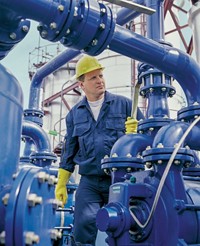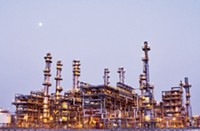Advertisement
Grab your lab coat. Let's get started
Welcome!
Welcome!
Create an account below to get 6 C&EN articles per month, receive newsletters and more - all free.
It seems this is your first time logging in online. Please enter the following information to continue.
As an ACS member you automatically get access to this site. All we need is few more details to create your reading experience.
Not you? Sign in with a different account.
Not you? Sign in with a different account.
ERROR 1
ERROR 1
ERROR 2
ERROR 2
ERROR 2
ERROR 2
ERROR 2
Password and Confirm password must match.
If you have an ACS member number, please enter it here so we can link this account to your membership. (optional)
ERROR 2
ACS values your privacy. By submitting your information, you are gaining access to C&EN and subscribing to our weekly newsletter. We use the information you provide to make your reading experience better, and we will never sell your data to third party members.
Business
Total Bucks The Trend
French refiner promotes petrochemical integration while maintaining specialty chemical portfolio
by Marc S. Reisch
May 28, 2007
| A version of this story appeared in
Volume 85, Issue 22

IT WAS JUST ABOUT a year ago that France's Total spun off its industrial chemicals arm, Arkema, to shareholders. The move allowed the giant oil exploration and refining firm to focus its Total Chemicals arm on a petrochemical business closely integrated with its oil refining activities and on an entirely separate specialty chemical business.
"We are comfortable with our portfolio now," says François Cornélis, president of Total Chemicals, based in Brussels. Both the petrochemicals and specialty businesses have growth potential and are likely to contribute significantly to Total's profits in the future, he says. While chemicals are almost an afterthought for many other large refiners, Total considers them core operations.
When Total formed Arkema in 2004, it was a "pure midsized chemical operation that needed improvement," Cornélis tells C&EN. Arkema's businesses were a complex mix of chlorine derivatives, technical polymers, plastic additives, thiochemicals, fluorochemicals, and agrochemicals, to name a few. Many came into Total's portfolio through its mergers with European oil firms Petrofina and Elf Aquitaine in 1999 and 2000, respectively.
It was no surprise that Total would want to focus on its more profitable oil and gas business, where sales last year topped $169 billion. The roughly $6 billion in sales that Arkema represented would hardly be missed. Other large oil producers had similarly shed industrial chemical assets. Shell had already cast off urethane foam, polyvinyl chloride, polyethylene terephthalate, and elastomers. BP jettisoned businesses in specialty chemicals, engineering polymers, and carbon fibers.
Jonathan Rigby, a London-based stock analyst with investment bank UBS, points out that "Arkema didn't fit with Total's oil and gas operations. It was a vestige of a previous life. The best thing for Arkema was for it to be independent and grow on its own."
Cornélis agrees and proudly points out that Arkema wasn't left to fend for itself. "We spent money and several years improving Arkema," he says. Other chemical operations have been split from their parents without such coddling. Rhodia and Solutia, which were spun off from Rh'ne-Poulenc and Monsanto, respectively, have faltered. Arkema, in contrast, has taken off since its separation from its parent, Cornélis notes, and its stock price has gone from 27 euros to more than 47 euros per share.
MORE OF A SURPRISE is that Total has steadfastly held onto its petrochemical and specialty chemical businesses. While BP sold off its olefins and derivatives business to Ineos and Shell sold its share in polypropylene maker Basell to Access Industries, Total has bucked the trend and pursued a strategy of integrating its oil and petrochemical assets.
UBS's Rigby sees an industrial logic behind Total's decision to retain petrochemical operations. But the specialties businesses, which include adhesives, electroplating chemicals, resins for inks, and rubber products "don't exactly fit," he says. "They divert management's time."
Far from being a diversion, Cornélis counters, the specialty operations are an important part of Total's portfolio. And if anyone could see the logic behind running two operations at opposite ends of the chemicals continuum, it would be a veteran like Cornélis. A mechanical engineer with a degree from the University of Louvain, in Belgium, he joined Petrofina 34 years ago. Cornélis, 58, has held senior management positions in chemicals for eight years since Petrofina's merger with Total.
"Our petrochemical operations are highly integrated with petroleum refining operations," he says. The firm has 14 major petrochemical sites, most of them in Belgium, France, and the U.S., but also in Singapore and China. The majority are tightly integrated with Total's refineries. The firm also operates an integrated petrochemicals site with Samsung General Chemicals in Daesan, South Korea. And it is a partner in an ethane-based steam cracker and low-density polyethylene plant in Qatar.
Sales of petrochemicals and fertilizers in 2006 were $15.1 billion out of $24.0 billion for Total Chemicals as a whole. Petrochemical sales rose 17% compared with the company's 2005 figures, Total says, driven by strong demand throughout the year.
Total Chemicals At A Glance
Headquarters: Brussels
Sales: $24.0 billion
Operating income: $1.5 billion
Capital spending: $1.1 billion
Employees: 44,680
BUSINESSES (% of total sales):
Base Chemicals (63%): Petrochemicals including ethylene, propylene, and benzene; polymers including polyethylene, polypropylene, and polystyrene; fertilizers
Specialty Chemicals (37%): Resins for inks, paints, and coatings; rubber products for automotive, aerospace, and consumer markets; adhesives; chemistry and equipment for electroplating and printed circuit boards
Website: www.total.com
The specialty chemical operations, however, "run on their own merits," Cornélis says. And, he adds, "we are not inclined to separate or spin off" the specialty operations, which include the Hutchinson rubber products business; the Cray Valley, Sartomer, and Cook Composites & Polymers resins companies; the Bostik adhesives franchise; and the Atotech electroplating unit. These application-oriented businesses "provide a measure of equilibrium in our otherwise cyclical chemical business," he says.
The specialties companies are close to their customers and are "less capital intensive and less influenced by wide swings in the price of oil" than are the petrochemical operations, Cornélis says. They "compete with the best in their sector and create value for Total." The company's specialty chemical sales were up 9% to $8.9 billion in 2006 from the year earlier.
Although the firm does not break out sales for individual specialty operations, a number of these units were particularly strong performers last year. Sales in the electroplating unit were up 19% compared with 2005 as Atotech expanded capacity in China and Germany and commissioned a new manufacturing and technical center in South Korea. The Bostik adhesives business grew by 15%.
Total invests $250 million or so each year to acquire what Cornélis describes as "synergistic" businesses to boost its specialties portfolio. For instance, Atotech acquired Germany-based Kunz, a specialist in anticorrosion coatings. Bostik acquired four adhesives-related businesses in the U.K., Germany, and Mexico, as well as DuPont's laminated adhesives activities in Germany. Cornélis points out that about 2% of specialties sales growth comes through such acquisitions.
In its petrochemical business, Total expects to spend nearly $1.3 billion over the next four years, much of it to take advantage of growth opportunities in Asia. At their South Korean joint venture, Total and Samsung are adding 200,000 metric tons of ethylene capacity to raise capacity at the site to 850,000 metric tons by 2008.
Total has other Middle East projects under way to take advantage of low-cost feedstocks. Together with Qatar Petrochemical, Total has invested in ethylene and polyethylene projects in Qatar that by 2010 will raise its petrochemical capacity, based on "advantaged feedstocks," to 19% of its total from about 14% today. Also being studied is a 650,000-metric-ton aromatic chemicals unit in Al-Jubail, Saudia Arabia.
Total also is eyeing opportunities in China, Cornélis says. "Every global player wants to be there," he observes. And China is where much of the firm's new output from South Korea and Qatar will be going. But while Total would like to undertake a significant integrated refining and petrochemical project in China, he acknowledges that government limitations on ownership and the slow pace of discussions with potential Chinese partners mean "business opportunities do not easily materialize."
As Total's petrochemical footprint expands in Asia, it will contract in Europe. While its U.S. operations are strong, Cornélis says operations in Europe are "less efficient, and we are not showing the profit we would expect." As a result, the firm plans a nearly $500 million project to revamp two European sites by 2011. About 300 jobs will be lost through attrition and early retirement.
In Carling, France, Total will close a 240,000-metric-ton ethylene cracker and shutter a 330,000-metric-ton styrene plant by 2008. The firm's styrene plant in Gonfreville, France, will be expanded by 50% to 600,000 metric tons, thereby making it the largest such plant in Europe. Total also plans to realign polystyrene and polyethylene production at the two sites.
French workers were not entirely happy with the plan and staged a short strike after the company announced the proposal in September 2006. But Cornélis says the changes are necessary to improve the competitive posture of Total's styrenics business.
IN ANOTHER cost-saving effort, Total and engineering firm UOP are building a pilot plant in Feluy, Belgium, to test a new process for converting methane-derived methanol into ethylene and propylene. The methane could be obtained from natural gas or coal, according to Cornélis.
With a wary eye on the numerous projects in the Middle East to liquefy and transport natural gas fuel to the U.S. and Europe, Cornélis wonders whether the region will have enough methane left to feed methanol-to-olefins plants. But "the Chinese are extremely interested" in the process, he says, because China has enormous coal reserves. Still, he notes, "we will need to prove the technology first. Then we will decide on the best way to apply it."
Other ways of doing business and satisfying customer demands are also under consideration. For instance, Total is talking with unnamed potential partners about setting up a biopolymers joint venture in Europe, Cornélis says. Still, he says large-scale biopolymer production most likely will take some time to realize.
"Integrated petrochemical platforms are essential for our future," Cornélis says, because large-volume polymers like polyethylene, polypropylene, and polystyrene won't soon be displaced. And while those products will have their ups and downs, Total is comfortable with its investments in them and in its stand-alone specialty chemicals businesses.





Join the conversation
Contact the reporter
Submit a Letter to the Editor for publication
Engage with us on Twitter